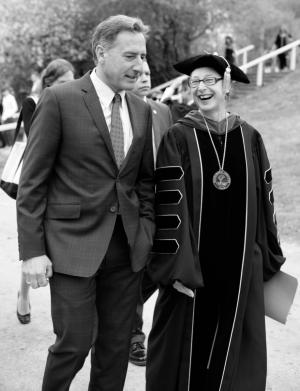Liberated by Education
From the commencement remarks of President Ellen McCulloch-Lovell

…There’s something called the White House Scorecard that purports to measure the “value and performance” of colleges. Here’s what it measures: net price; graduation rate; loan default rate; the median amount borrowed; and the type of job and salary earned after graduation.
See the trend? It’s all about money. We need to redefine “ROI – return on investment.” What about the other returns: the return on the individual; the return on the community? Research reveals that the person with a college degree not only earns more, but is more likely to vote, to give to her favorite causes, and to volunteer.
You are graduating with the degree most connected to that exercise of choice—a degree in the “liberal arts.” Why do we use that term? Our classics fellow could tell us the derivation from the Greek and Latin: “liberal” comes from the word for “free.” From medieval times until recent history, universities taught prescribed courses thought to constitute the “knowledge worthy of a free man.”
But our sense of “liberal” is “liberation”—that we might be “liberated by an education…in the service of human freedom.” So says William Cronon in his 1998 article in The American Scholar. What makes a liberally educated person? It’s not a transfusion of facts or content, but rather a set of skills and qualities. To paraphrase Cronon, they are: to listen and to hear; to read and to understand; to write clearly and persuasively; to solve a variety of problems; to respect rigor as a way of seeking truth—to love learning; to practice humility, tolerance, and self-criticism, opening yourself to different perspectives; to understand how things get done in the world; to nurture and empower the people around you, recognizing that “no one acts alone”; to see the connections that allow one to make sense of the world and act creatively within it.
Is this sounding familiar? It should. I think I just described the qualities of your Marlboro education. I’ve lavished some of our last moments together on these to make Cronon’s final point: “Education for human freedom is also education for human community.” In other words, for the “social good,” the culture of connection.
Recently a student told me, “Marlboro presumes tremendous individual capacity and responsibility.” That’s what education for liberation teaches. Why don’t we have a Scorecard for becoming an educated citizen? …Take all those skills you gained researching, organizing, and writing your Plan, and with confidence and joy, believe in yourself and your powers as a liberated and liberating citizen.
